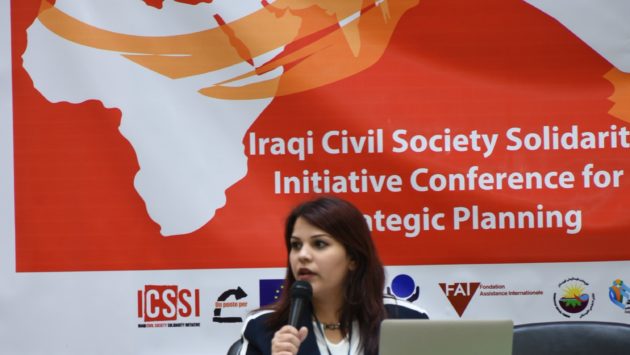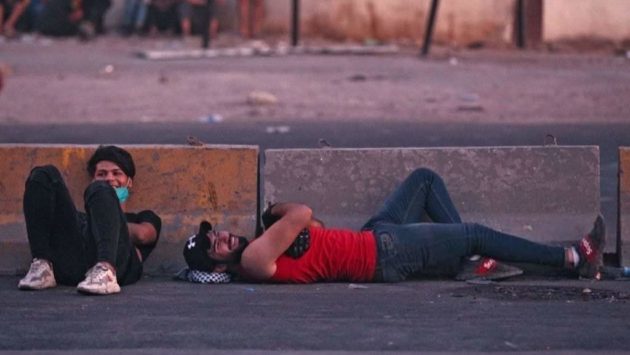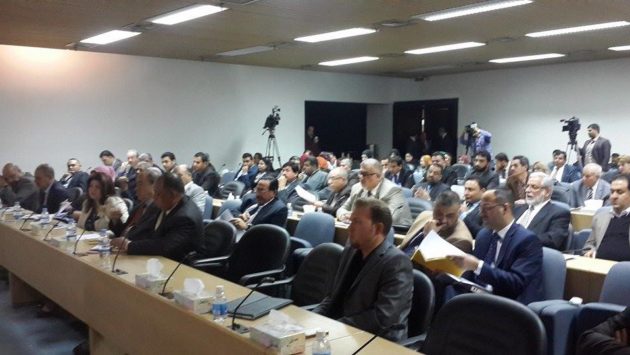Freedom of Expression and the Work of Civil Society Organizations During COVID-19 with a Focus on the Kurdistan Region of Iraq
Access to accurate information, a free press, and freedom of expression are vital to democracy and the health of civil society at all times, but never more so than when people are confronting an unprecedented crisis like the COVID-19 pandemic. As it continues its live webinars, the Iraqi Civil Society Solidarity Initiative (ICSSI), in collaboration with the Peace and Freedom Organization (PFO), Al-Mesalla Organization, and the Kurdistan Social Forum, took a deeper look at the situation in the Kurdistan Region of Iraq (KRI) where there have been recent arrests of human rights defenders and journalists, and concern for the future of freedom and democracy is increasing.
Three experts shared their experiences and reflections on the pandemic’s implications for freedom of expression and the vitality of civil society:
- Abdulrehman Bamerni is a Journalist and Human Rights Activist; an active member of the Freedom Ambassador’s network, founded in 2016 to promote freedom of expression and access to information, he is also the Director of the Roshngary Organization for Promoting Democracy, in the Iraqi Kurdistan Region, Duhok.
- Ismaeel Dawood is the Secretary of the Iraqi Civil Society Solidarity Initiative.
- Abdulla Khalid is the Executive Director of Alternatives Network and Chairman of the Board of Directors of the Peace and Freedom Organization (PFO), in the Iraqi Kurdistan Region, Erbil.
Journalists Face New and Unprecedented Challenges
Mr. Bamerni emphasized that covering COVID-19 is a new experience for Kurdish journalists. Many are exposed to health risks. While they have been allowed to move within and between cities, they have little knowledge about how to protect themselves and others from infection. Also, getting good information and knowing what to report is difficult. This webinar is a great opportunity to begin to address some of these issues, and to understand the violence against journalists and the repression of civil society organizations (CSOs) and we have recently seen.
This repression is rooted in the social, political and economic structures of the KRI. The Kurdish political establishment is comprised of three powerful entities: 1) the first is the tribes and tribal leaders that wield considerable social, political and economic power; 2) the second is the religious clerics and religious institutions that influence society so profoundly; 3) and lastly are the political parties. The tribes, the religious institutions, and the political parties are all sources and beneficiaries of the corruption in the KRI. These three entities have joined forces against journalists and civil society organizations, in particular by denying them access to information. Most of the time, they do whatever it takes to prevent journalists and civil society organizations from exposing the reality and extent of the corruption. So we have seen journalists arrested, injured and even killed while trying to do just that. It is important to stress that this is not something new; this is not happening because of COVID-19, journalists and civil society actors have faced hostility, repression, imprisonment, and paid with their lives in the past.
Mr. Bamerni concluded by raising two additional concerns. The KRI has a strong press law, which was designed to protect journalists and guarantee their access to information without fear of reprisals. However, sometimes journalists are prosecuted under a different, unrelated law concerning “misuse of communication devices in the Kurdistan region”. In other cases they are prosecuted under the Iraqi ‘Penal Code’ that the Kurdish authorities have also implemented, which is extremely harsh. Secondly, all journalists do not have equal access to accurate first-hand information. Those who work for one of the two ruling parties’ media services can obtain all the information they require; although we know that they only publish what the parties allow. Other journalists can access only second-hand information from the parties’ media services. Then afterwards ministers or other government officials often prosecute these journalists for reporting information disputed by the government, which makes clear that the second hand information was not accurate. This can lead journalists to be accused of providing false information.
Protest, Freedom of Expression, and the Future of Iraqi Democracy
Ismaeel Dawood then asked webinar participants to use this unprecedented moment to reflect on the quality and condition of democracy in Iraq. Following months of extraordinary protest, led by young Iraqi men and women, do we have true democratic participation? Are representatives of the people making good decisions? We don’t even know if members of parliament are meeting in Iraq or in the KRI. Who is positioned to take advantage of this situation? Always it is those with executive powers. Even before COVID-19, there was a shortage of true democratic participation. Now that people are locked up at home, their participation is further diminished. People are challenged to find ways to get organized in order to have democratic impact. This is what is needed now, to continue to place the people’s demands before the government.
Access to information is certainly crucial, but freedom of expression, speech, and assembly are also major lynchpins of democracy. In some places the military is now in the streets. We do need to confront the disease and the pandemic. Governments have a right to limit freedoms in the face of an emergency, for example, some movement may be limited. But we must protect democracy from restrictions that are excessive and unnecessary. We must make sure they are time-bound. The government should not limit freedom of speech and expression: writing, posting, and convening webinars like this must be allowed and protected. The government should focus on what is relevant to addressing public health, controlling the spread of the disease, and protecting people. However, this should never justify indiscriminate, across-the-board restrictions. These concerns are about more than Iraq, about more than the KRI, they are concerns throughout the world.
Human rights are more vital than ever in times of crisis. Thus Mr. Dawood ended by challenging the webinar participants to use this moment to strengthen and re-envision democratic participation. This is not a moment fit for massive demonstrations, he stated. People cannot go out and occupy the streets and squares, but they do not need to lose their rights. We should be developing new methods and means of expression, pressure, and safeguarding our freedoms.
The Shrinking Space for Civil Society Organizations
Abdulla Khalid opened by observing that the pandemic has been a complete shock and a real setback for CSOs in the KRI. What we see right now is that only the business sector and the military can exercise power. When we talk about civil society, we must recognize that it had a limited space before pandemic. It is an initiative that had just started to function. It was not yet truly effective in Iraq or the KRI. Civil society’s importance is to be a link between the people and their government. We have seen, however, that civil society has so far not grown naturally. It is not independent.
Indeed, Mr. Khalid argued, in the KRI the government imposed a restrictive legal framework on civil society and its organizations. The government actually retains the power to shut down civil society entirely. Notably, in the KRI, the work of CSOs has been redefined and limited to delivering humanitarian aid. Although there are more than 5000 registered CSOs, only five are allowed to be active. Few are permitted to work on issues of health and safety, even during the pandemic.
Funding has always been a challenge and a constraint on the growth of CSOs. Because CSOs receive their funding from outside of Iraq, they adopt specific lines of work based on potential funding; this can actually limit their value and impact. Recently, Mr. Khalid observed, the KRI saw a huge influx of refugees and IDPs, many CSOs and even many governmental organizations shifted their focus to work on refugees and IDPs because of the funding that was available. Now, this funding is being cut, even by the UN.
The COVID-19 crisis has made the fragility of civil society in the KRI apparent. There are severe repercussions for CSOs that criticize the government’s handling of the pandemic. Many journalists have been imprisoned. With this crisis, there is again the risk of civil war between the two major political parties, the KDP and the PUK, and civil society lacks the power to stand up to this possibility.
How Can Civil Society Better Meet the Challenges of the Moment?
The relationships between journalists and CSOs are not strong enough, Mr. Bamerni argued. Journalists who are at risk are supported on social media but CSOs most of the time avoid these sensitive topics. Organizations that do good work, for example with refugees, are contacting the media. Now journalists are facing entirely, new challenges; they cannot go out because of COVID-19; information from government ministries is not reliable, and people want information about health and how to protect themselves. It is a moment for new relationships between journalists and CSOs.
Democracy and civil society are new in both Iraq and the KRI, but in both places we see many agreements on the challenges of COVID-19. One vital job of civil society is to monitor the government. This you can do from home, Mr. Dawood insisted. But in the KRI where the two political parties rule, we need to be very strategic. In criticizing the KDP and the PUK, civil society should explain that civil society in ALL parts of Iraq is concerned about the rights of the Kurds. Kurds have a right to true democracy and while parties have an important role, civil society also has a role to play in expanding democracy. This struggle belongs to all Iraqis.
This is also a moment of struggle for Kurdish society through out the larger region. In recent protests in Sulaymaniyah and elsewhere in the KRI, people risked their lives for freedom of expression. This is an opportunity to advance an example of true democracy created in the KRI that can be an inspiration in Turkey, Syria, and Iran. This is an historical moment of opportunity, because true democracy in the KRI is also necessary for a functioning central government in Iraq
The national budget was passed based on price of oil; now what is going to happen? Are we going to see people’s needs unmet—will there be starvation and death? Seventeen years of rule by political parties have not solved the problems of the Iraqi people—services, jobs, education, and a healthcare system. The role of civil society is to make government do its job. Dangerous times lie ahead; there can be racism between Arab and Kurds, active militias, and massive unemployment. It is crucial that Iraqi civil society and Kurdish civil society dialogue now.
Ending on a positive note, Mr. Dawood observed the amazing generosity and inspiration of Dohuk’s hosting of 1000s of refugees and IDPs—Arabs, Kurds, Yazidis, and Christians. People were willing to help one another. But, there is no lasting peace without dialogue, and dialogue is impossible without civil society participation. Yet there is another opportunity before us, in the disputed areas where civil society can help focus us on finding solutions by initiating dialogue. Don’t start by asking, “What militia is in charge?” The point is not to send in the Peshmerga. We must insist on dialogue to learn the wishes and the will of the people living in each territory. Let the people set the goals; this is the only path to a sustainable solution. Civil society can start the process.
The pandemic has seen the government take away many of our rights, Mr. Khalid warned, and there is a danger that people will allow these restrictions to continue after the pandemic ends. Now is the moment for civil society to re-strategize. We need to go back to the people and promote dialogue within the region. All the ethnic groups and minorities must be included. Together we must dialogue with the government at all levels. We need to advocate and have awareness projects. The promotion of human rights is the work of centuries; we must not abandon it. We need greater cooperation and interaction among CSOs at all levels, both internally and internationally. International solidarity is really needed when human rights are threatened. We can do more on social media, more education. In order not to lose what we have gained, we need to work together.
Building More Powerful International Civil Society Solidarity
Journalists and CSOs both represent and present the voices of the people, Abdulrehman Bamerni concluded. They need to find ways to work together more closely. They can join forces to see that when there are violations of human rights the government cannot ignore them. And if the government is responsible, it must be held accountable.
Abdulla Khalid saw a need to continue webinars that focus on civil society and the pandemic. We can learn about other communities’ experiences, especially where the situation is changing rapidly. The dangers I see, he emphasized, restrictions on human rights and workers rights can be addressed by putting pressure on Iraqi embassies outside of Iraq. The Iraqi government and the KRI government do not take international reports of violations seriously enough. They ignore the universal periodic review (UPR) of the UN. International CSOs needs to put their power behind promoting these important reports.
The pandemic has created a moment when international solidarity is critical, but this cannot be a single act, Ismaeel Dawood stressed. We need to be educated about the issues more than once; we need to keep hearing about the human rights situation in the KRI. International CSOs should pressure their consulates to take action within the KRI and provide healthcare and economic support. All CSOs must emphasize that civil society is the basis of democracy—everywhere!




